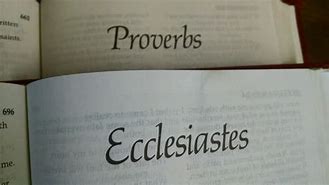
Understanding Proverb and Ecclesiastes
Pastor Robert Zemke
We are in a sermon series on Proverbs, one of the five wisdom books in the Bible. Taken together, we have a treasure from God’s word to help us grow in wisdom. Knowing how to read them is essential since they seem to contradict one another, like Ecclesiastes and Proverbs.
Proverbs asks us to seek wisdom and to use it in everyday life, and if you are wise in life, you will prosper, whereas fools come to destruction. Proverbs 3:35, “The wise will inherit honor, but fools get disgrace.” Proverbs 10:21, “The lips of the righteous feed many, but fools die for lack of sense.” Proverbs 21:23, “Whoever keeps his mouth and his tongue keeps himself out of trouble.”
If we take Proverbs 21:23 in an absolute sense, we could think that if we control our mouth and tongue (not easy to do), we will never experience trouble. But if you experience unexpected trouble, you would think this verse is untrue.
Ecclesiastes, on the other hand, focuses on the meaning and purpose of life. The book critiques those extracting their primary meaning of life from this world. It is not an attack on atheists but on those who may believe in God but keep him at a great distance. No matter how faithful or spiritually mature someone is, the allure of the world is difficult to resist. Ecclesiastes begins by stating, “All is vanity. What does man gain by all the toil at which he toils under the sun? A generation goes, and a generation comes, but the earth remains forever. The sun rises, and the sun goes down, and hastens to the place where it rises. The wind blows to the south and goes around to the north; around and around goes the wind, and on its circuits, the wind returns.” (Ecclesiastes 1:2-6) You could understand this to mean it does not matter what I do since even with God, my life is less important than I think.
Both authors make applicational generalizations in a specific area and rarely intend to have unlimited scope. The task in interpreting wisdom literature is to recognize the particular scope of the author and thus apply the truth in that specific scope.
The generalizations are stated in maxims, which are statements of truth that are always true but whose scope is not intended to be an exhaustive or comprehensive statement of the truth concerning a subject. Maxims state truth from one perspective without intending to say all that there is to say about that subject.
Ecclesiastes is the search for the ultimate maxim to explain the nature of life. However, life is not found in the storehouse of wisdom, but it is a gift from God given to be used in a responsible yet rewarding fashion. The central theme is that God desires us to love and fear him all of our days. In Proverbs, fearing God and living wisely in all facets of life is paramount. It will generally go well for you when you do, but a life without trouble is not promised.
It is essential to grow in wisdom when there is so much foolishness in the world.





